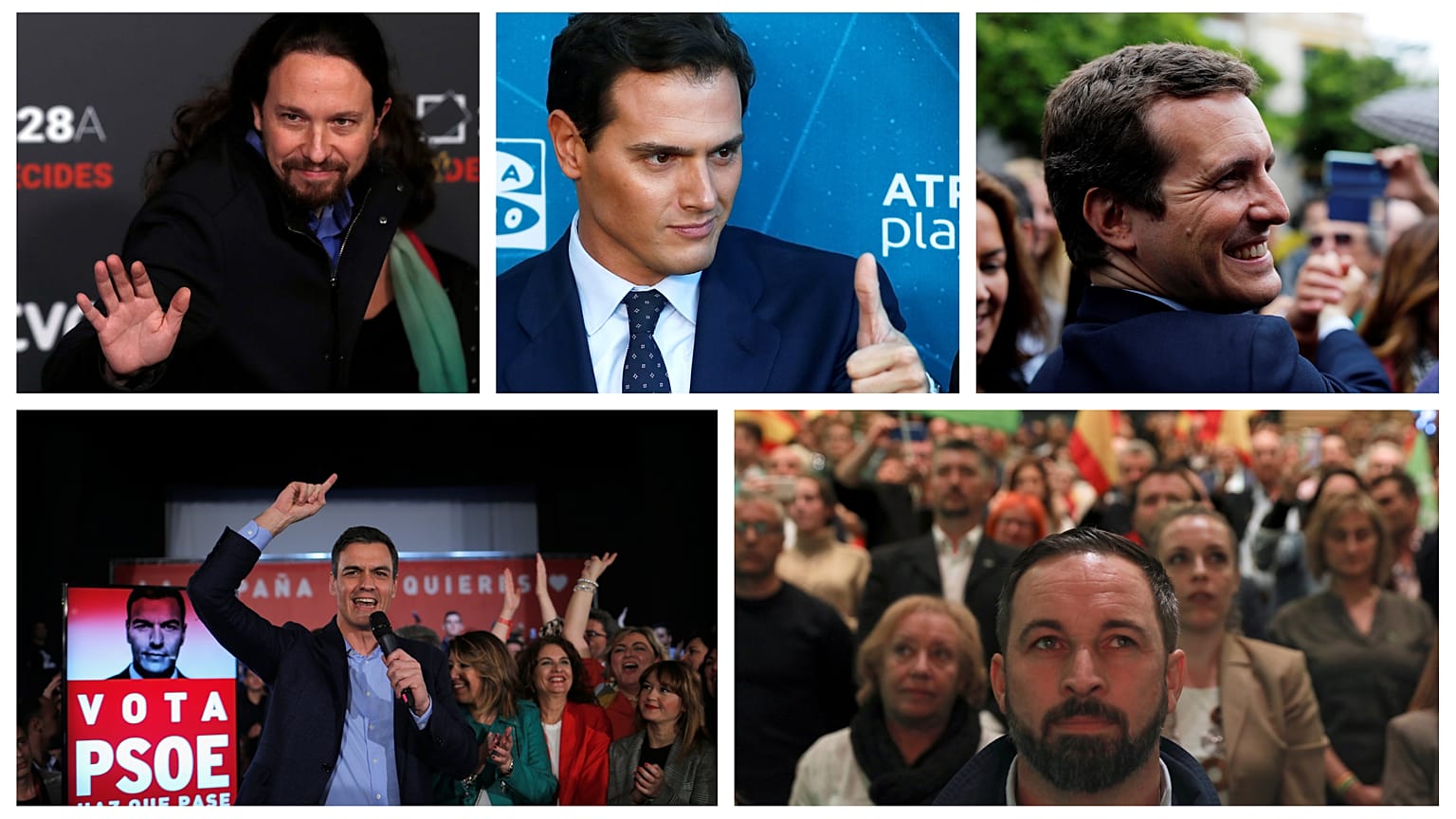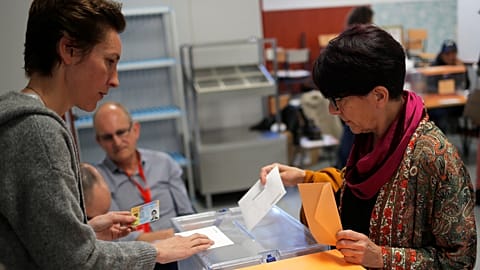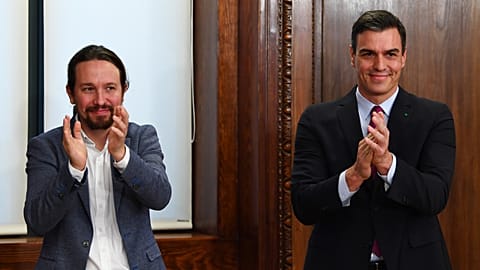Spain's election and the battle for control of social media
In these Spanish elections, political parties are not only waging a battle for voters on the streets but also on social media.
Social media has become an essential tool for political parties in campaigning for Sunday's general election in Spain.
 ADVERTISEMENT
ADVERTISEMENT
 ADVERTISEMENT
ADVERTISEMENT
They have been spreading their message via Facebook and Twitter but also through other platforms, such as Instagram — which attracts a younger crowd — and messaging apps.
Political candidates are completely aware of how important it is to invest in a good social media strategy because platforms have become the most direct way to sell political ideas to an electorate.
In these elections, the use of social media by all parties has been key, although not everyone has achieved the same results.
By collecting data from the parties' social accounts, Euronews was able to infer that the far-right Vox party has the biggest following on Instagram but that the left-wing Podemos remained the most influential on Facebook and Twitter.
The best strategies on social media
On Mark Zuckerberg’s platform, the winner is the left-wing Podemos. The official page of the party, created in January 2014, has more than a million ‘likes’ — a bigger number than the other parties. In second place comes Ciudadanos (with more than 330,000 likes) and Vox with more than 270,000.
Pablo Iglesias’ Podemos party, which is very active on Facebook, uses the platform to promote public meetings with the constituency, live stream campaign events, and share their anti-corruption government plans.
According to social media expert Julio Cesar Herrero, their popularity could be explained by one simple factor: they got there first.
"Facebook and Twitter were the two most used platforms in the beginning. Podemos was the party that best used the platforms in the last elections," said the expert.
Second place goes to Albert Rivera’s centre-right party Ciudadanos, which has the oldest Facebook page (2009). Many of the posts criticise corruption, bipartisanship, and current Spanish prime minister Pedro Sanchez.
Vox’s page, created in 2014, welcomes Facebook users with the “Spanish first” slogan as their cover photo. In addition to sharing all of the party’s views, it also mentions the “media war” allegedly waged against them. On the other hand, the content they share creates a lot of polarisation since many of them trigger an avalanche of commentaries from all political sides.
According to Herrero, Twitter and Facebook, even though they continue to be important, have lost steam in the last couple of years.
"Perhaps, it was a general distrust surrounding disinformation," he said.
Instagram — the Facebook-owned photo- and video-sharing social networking service — has become more important in recent years.
Of all the parties, Vox is one of the best users of the platform.
The far-right party has more than 250,000 followers, far ahead of Podemos (137,000) and Ciudadanos (around 86,000).
Their first post on the visual platform in 2016 read: “Now on Instagram, the party that openly defends the unity of Spain, the normal Spaniards against the abuse of politicians, and proudly shows the signs of Spanish identity, freedom, rule of law, and democracy.”
Instagram is the social network that grew the most in 2018 in Spain. 65% of users are between 18 and 39-years-old and so a good platform to reach the younger generations.
"Instagram is the most used social network. It's a platform that allows using visual content far better than Facebook and Twitter (...) This is very important when you're trying to create a sense of belonging to a group. It allows to know which others think like you and give them a face," said Herrero.
The expert added that campaigning on social networks is essential for Vox since they don't count with the same resources as the other parties and their participation in traditional media is very limited.
Despite being less expensive, they also count with algorithms that can find people who share the same interests and be more akin to their political beliefs.
Vox was also the network that grew the most on WhatsApp and Messenger.
However, it looks like being the most active is not what pays off the most. Spain's People's Party (PP) is the party that publishes the most but has one of the worst popularity scores on the platform. But the country's socialist workers' party (PSOE) had the worst score of all.
"The PSOE is surely the one that has the most trouble in exploiting the capacities of social media," said Herrero.
What is the secret to success?
With the help of the social monitoring tool CrowdTangle, we were able to pick out the most successful publications for each of the parties in the last 30 days.
For Podemos, Tuesday’s debate was the most successful publication on Facebook and Twitter.
Ciudadanos posts show a curious trend. Unlike Podemos, where the social media star is the party leader, Ciudadanos is more popular than its leader Albert Rivera. Opposition leader and president of Ciudadanos in the Catalan Parliament, Ines Arrimadas, has been more popular than Rivera on Facebook and Twitter in the last 30 days. In Instagram, it was a photo of their “health card” — one of the party’s main plans to allow Spaniards to get health coverage anywhere in the country — that got the top spot.
On Twitter, a video of Sanchez saying that “when a woman doesn’t say yes, it’s a no” during one of the debates is what most pleased PSOE voters in the last 30 days. On Facebook, a speech by Sanchez in northeast Spain was the most seen and in Instagram, the photo of a man with Down syndrome visiting the party headquarters stole followers’ hearts.
For the right-wing People's Party (PP), it seems like criticising the PSOE and Sanchez is the best strategy to get engagement. Their most popular posts on Facebook and Twitter lately have been direct critics to the left-wing opposition. In Instagram, followers reacted considerably when the party announced that Pablo Casado would be the candidate.
Vox won over Instagram and Facebook by sharing an article from the left-wing magazine CTXT that interviewed a worker who explained why he would be voting for the far-right party. On Twitter, the most popular post was a speech by the party’s leader Santiago Abascal in Granada. The party asked its followers to retweet the speech since it wouldn’t be broadcasted by television.
But does social media show reality?
If social media popularity translated to how people would vote, then the elections would be disputed between Vox and Podemos. However, all the polls point to the PSOE getting a majority.
Social networks "are good for mobilising, identifying, and creating groups" but "we should not forget that they generate a kind of parallel universe," said Herrero.
"They can give the feeling that a party has an extraordinary following because the algorithm puts you in contact with people that are searching the same thing but it doesn't necessarily reflect reality."
In fact, sometimes rogue groups decide to use social platforms to spread disinformation and hate speech. This week, Facebook took down three different far-right networks that were spreading false information to nearly 1.7 million people ahead of the Spanish general elections on Sunday.
The tech giant took the groups down after receiving a report by the campaign group Avaaz on April 12. They were called Unidad Nacional Española (UNE), Todos Contra Podemos, Lucha por España.
Together, the networks had nearly 1.7 million followers and more than seven million total interactions in the past three months alone.
They mostly posted anti-immigration, anti-LGBT, and anti-feminist content, according to Avaaz, and sometimes content that misinformed.
Avaaz also found that the networks were behind a coordinated strategy to post identical content designed to look like spontaneous messages.
But Facebook said they had not taken down the Spanish pages because of their content or for “coordinated inauthentic behaviour” — a glossy term Facebook uses to speak about disinformation spread by a foreign entity.
Instead, they took down the pages because they broke the platform’s rules.
“We have removed a number of fake and duplicate accounts that were violating our authenticity policies, as well as one Page for name change violations,” said the spokesperson. "We aren’t removing accounts or Pages for coordinated inauthentic behaviour."
“As in other cases, we removed these accounts based on their behaviour, not the content they posted. Some additional Pages were also disabled because they were administered solely by fake accounts.”

















